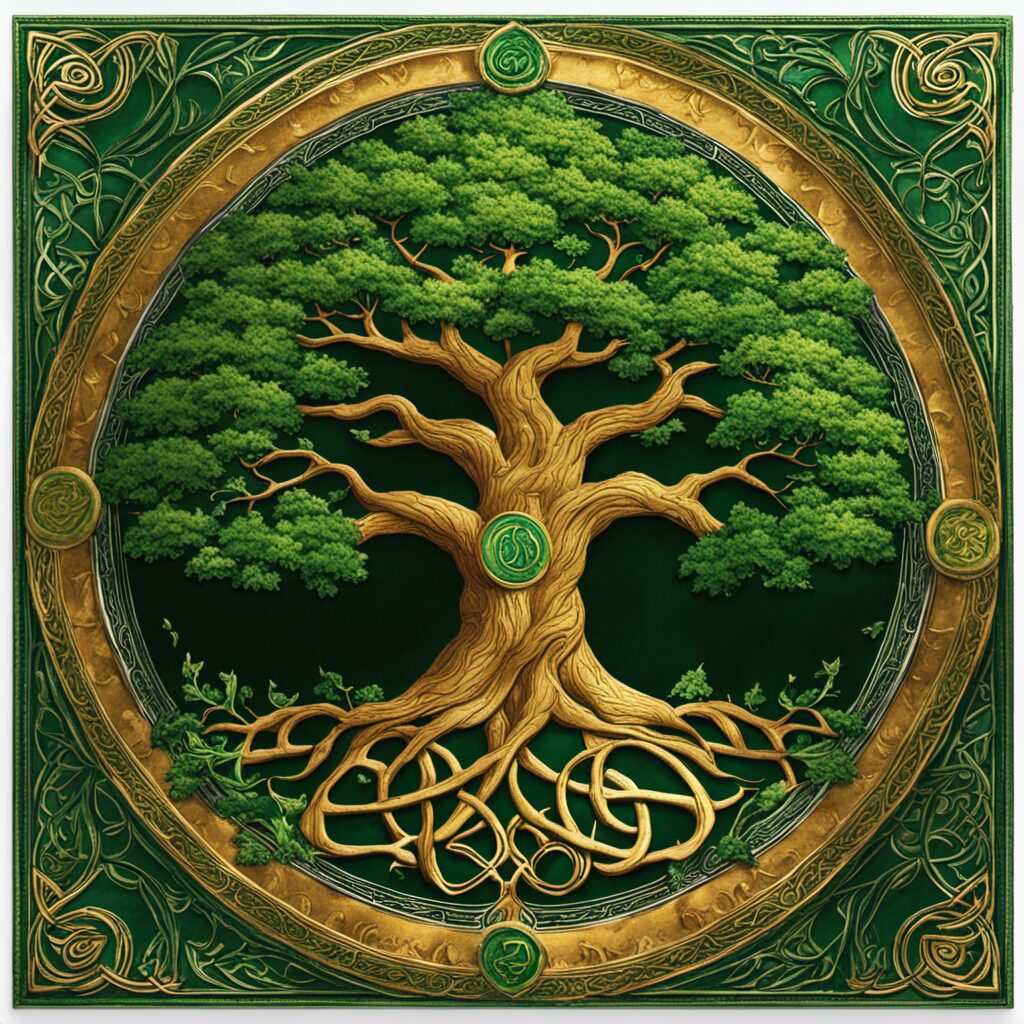The Celtic calendar, known for its historical significance and cultural importance, offers practical applications that can enhance personal well-being, provide astrological insights, aid in planning and time management, facilitate rituals and celebrations, as well as foster cultural and spiritual connections.
While some may question the relevance of an ancient calendar in today’s modern world, this article aims to demonstrate the tangible benefits that can be derived from utilizing the Celtic calendar in various aspects of life.
This objective exploration will rely on analytical reasoning and evidence-based research to support its claims.
Key Takeaways
- The Celtic calendar helps preserve and revive ancient customs, rituals, and festivals, maintaining unique cultural heritage.
- It promotes personal well-being and spiritual connection by increasing mindfulness, self-reflection, and a sense of belonging.
- The Celtic calendar aligns with the natural cycles of the environment, fostering a deeper connection to nature and promoting a harmonious relationship with surroundings.
- It provides astrological insights and predictions, allowing for the identification of favorable periods for activities and offering insights into personality traits, relationships, career prospects, and spiritual growth.
Historical Significance of the Celtic Calendar
The historical significance of the Celtic calendar can be observed through its influence on various cultural and religious practices.
The Celtic calendar has its historical origins in the ancient Celtic culture, which flourished in Europe during the Iron Age. It was a lunar-based calendar that divided the year into different cycles and marked important agricultural events and celestial observations. The calendar played a crucial role in the lives of the Celts, helping them navigate their environment and organize their activities.
Cultural adaptations of the Celtic calendar can be seen in various aspects of Celtic society. One notable example is how it shaped religious practices. The festivals and rituals associated with specific dates in the calendar were deeply intertwined with religious beliefs and customs. These celebrations served as opportunities for communal gatherings, where people would honor deities, seek blessings, perform sacred rites, or commemorate significant events.
Additionally, the Celtic calendar influenced cultural traditions beyond religion. It guided agricultural activities such as sowing seeds, harvesting crops, or tending livestock based on favorable lunar phases or seasonal changes. Furthermore, it had implications for social organization and governance by influencing decisions related to trade routes, political alliances, or military campaigns.
Enhancing Personal Well-Being With the Celtic Calendar
One potential application of the Celtic calendar is its ability to contribute to personal well-being. The use of this ancient calendar system can have various benefits that promote personal growth and mental health.
Increased mindfulness: The Celtic calendar follows a cyclical pattern, with each month corresponding to a specific natural phenomenon or deity. By following this calendar, individuals can develop a deeper connection with nature and become more attuned to the rhythms of the seasons. This increased mindfulness can lead to reduced stress levels and improved mental well-being.
Enhanced self-reflection: The Celtic calendar includes important dates for introspection and self-reflection, such as Samhain (end of harvest season) and Imbolc (beginning of spring). These periods provide opportunities for individuals to reflect on their goals, values, and personal growth. Engaging in these practices can foster self-awareness and facilitate positive changes in one’s life.
Community engagement: Many traditional Celtic festivals are celebrated communally, emphasizing the importance of social connections for personal well-being. Participating in these celebrations allows individuals to connect with others who share similar values and interests, fostering a sense of belonging and support. This sense of community can have significant positive effects on mental health by reducing feelings of isolation and promoting overall happiness.
Astrological Insights From the Celtic Calendar
Astrological insights can be derived from studying the Celtic calendar, providing valuable knowledge about celestial events and their potential influence on human experiences. The Celtic calendar is based on a combination of lunar and solar cycles, incorporating both natural and astrological elements. By examining the alignment of celestial bodies with specific dates in the calendar, astrologers can gain insights into various aspects of life, including personal well-being, relationships, career prospects, and spiritual growth.
The Celtic calendar consists of several festivals that mark important points in the year, such as Samhain (Halloween) and Beltane (May Day). Each festival corresponds to a particular phase in the agricultural cycle or significant cosmic alignments. Astrologers analyze these events to predict favorable periods for certain activities or identify potential challenges that individuals may face during specific times.
One example of astrological guidance derived from the Celtic calendar is the association between certain zodiac signs and specific trees. According to ancient beliefs, each month is associated with a particular tree which influences the characteristics of individuals born during that time. This provides insight into personality traits, strengths, weaknesses, and compatibility with others.
Planning and Time Management With the Celtic Calendar
Efficient scheduling with the Celtic calendar involves strategically aligning tasks and activities with the cycles and energies represented by each of its months, days, and hours. By understanding the symbolism and correspondences associated with these time divisions, individuals can optimize their productivity by prioritizing certain types of work during specific periods.
Research has shown that maximizing productivity using the Celtic calendar can lead to improved time management skills, increased focus, and a greater sense of accomplishment in daily tasks.
Efficient Scheduling With Celtic Calendar
Scheduling events using the Celtic calendar allows for a structured and systematic approach that maximizes productivity and minimizes conflicts. This ancient calendar system, rooted in the agricultural practices of the Celtic people, offers several benefits for improved organization and effective time allocation.
Alignment with natural rhythms: The Celtic calendar is closely tied to seasonal changes and celestial events, enabling individuals to align their activities with nature’s cycles. By considering factors such as weather patterns, plant growth stages, and animal behavior, scheduling becomes more harmonious and efficient.
Integration of cultural significance: The Celtic calendar incorporates various festivals, religious observances, and historical events specific to this ancient culture. By integrating these important dates into one’s schedule, individuals can honor their heritage while also creating opportunities for community engagement or personal reflection.
Enhanced awareness of interconnections: Through the use of the Celtic calendar, individuals gain a deeper understanding of how different aspects of life are interconnected. Recognizing these relationships enables better coordination between personal commitments, work responsibilities, social engagements, and self-care activities.
Maximizing Productivity Using Celtic Calendar
The utilization of the Celtic calendar in managing time can contribute to a more structured approach, enhancing productivity and goal attainment.
The Celtic calendar, known for its connection to nature and seasonal cycles, offers a unique perspective on time management that can be applied to maximize productivity. By aligning tasks and goals with the natural rhythms of the seasons, individuals can effectively allocate their resources and energy to achieve desired outcomes.
Incorporating the Celtic calendar into daily planning allows for efficient time management by prioritizing activities based on their relevance to specific seasons or lunar phases. This approach promotes a balanced distribution of effort throughout the year, preventing burnout and ensuring sustainable progress towards goals.
Furthermore, leveraging the wisdom embedded in ancient traditions like the Celtic calendar adds depth and meaning to one’s daily routines, fostering motivation and overall well-being.
Rituals and Celebrations Based on the Celtic Calendar
Rituals and celebrations based on the Celtic calendar provide a unique way to honor and connect with the natural world. The Celtic calendar is deeply rooted in the cycle of seasons, with festivals and rituals marking important points throughout the year. These celebrations serve various purposes, from agricultural significance to spiritual connections.
- Agricultural Significance: Celtic festivals were closely tied to the changing seasons and played a vital role in agricultural practices. For example, Beltane marked the beginning of summer when livestock were driven to summer pastures, while Lughnasadh celebrated the first harvest of grains.
- Spiritual Connections: Celtic festivals provided opportunities for individuals to connect with their spirituality and foster a sense of community. Samhain was a time when the veil between worlds was believed to be thinnest, allowing communication with ancestors, while Imbolc honored Brigid, an important goddess associated with healing and inspiration.
- Harmonizing with Nature: Rituals based on the Celtic calendar emphasized living in harmony with nature’s rhythms. By observing seasonal rituals, individuals could align themselves with the natural cycles of growth, death, and rebirth.
These rituals and celebrations not only offered practical benefits for agriculture but also served as opportunities for spiritual reflection and fostering a deeper connection with nature.
Cultural and Spiritual Connections Through the Celtic Calendar
This discussion explores the cultural and spiritual connections that arise through the use of the Celtic calendar. It focuses on three key points: ancient traditions preserved, aligning with natural cycles, and enhancing spiritual practices.
By following the Celtic calendar, individuals are able to maintain and honor ancient traditions that have been passed down through generations, preserving their cultural heritage.
Additionally, aligning with natural cycles allows for a deeper connection to the rhythms of nature and fosters a sense of harmony with the environment.
Ancient Traditions Preserved
Preserving ancient traditions, the use of the Celtic calendar in practical applications allows for a continuity of cultural practices that have been passed down through generations. This preservation of heritage is vital for ensuring a sense of identity and cultural revival within Celtic communities.
The benefits of using the Celtic calendar in practical applications are as follows:
- Cultural Preservation: The use of the Celtic calendar allows for the preservation and continuation of ancient customs, rituals, and festivals that hold significant cultural importance. By adhering to this traditional timekeeping system, communities can maintain their unique heritage.
- Revitalizing Traditions: Incorporating the Celtic calendar into practical applications provides an opportunity to revive and reintroduce forgotten or neglected traditions. This revitalization helps reconnect individuals with their cultural roots and fosters a renewed sense of pride and belonging.
- Community Cohesion: By utilizing the Celtic calendar, communities can come together to celebrate important events collectively. This shared experience strengthens social bonds, promotes unity, and reinforces a sense of community among its members.
Aligning With Natural Cycles
Aligned with the natural cycles of the environment, the incorporation of traditional timekeeping systems allows Celtic communities to synchronize their activities with seasonal changes and celestial events.
The Celtic calendar is based on an understanding of natural rhythms and ecological awareness. By observing and honoring these natural cycles, Celtic communities were able to maintain a harmonious relationship with their surroundings.
This ecological awareness enabled them to plan agricultural activities, such as planting and harvesting crops, according to the optimal times dictated by nature.
Additionally, aligning with the natural rhythms of the environment allowed for a deeper connection with celestial events such as solstices and equinoxes. This not only fostered a sense of spiritual connection but also facilitated practical applications like navigation and determining auspicious times for important rituals or ceremonies within the community.
Overall, incorporating traditional timekeeping systems helped Celtic communities live in harmony with nature while providing practical benefits for their everyday lives.
Enhancing Spiritual Practices
Enhancing spiritual practices, the incorporation of traditional timekeeping systems within Celtic communities fostered a deeper connection with celestial events and facilitated auspicious times for important rituals or ceremonies. The Celtic calendar, with its emphasis on nature and cyclical patterns, provided a framework for spiritual growth and mindfulness practices.
Alignment with natural cycles: The Celtic calendar closely followed the rhythms of nature, enabling individuals to attune themselves to the changing seasons and celestial events. This alignment allowed for a heightened sense of awareness and connection to the natural world.
Ritual significance: By incorporating celestial events into their calendar, such as equinoxes or solstices, the Celts were able to identify auspicious times for performing important rituals or ceremonies. This added an element of sacredness and intentionality to their spiritual practices.
Deepening spirituality: The use of the Celtic calendar encouraged individuals to engage in regular mindfulness practices that centered around observing and honoring natural phenomena. This deepened their understanding of the interconnectedness between themselves, nature, and higher realms of existence.
Overall, integrating traditional timekeeping systems within Celtic communities enhanced spiritual practices by promoting mindfulness, fostering a closer bond with nature’s cycles, and facilitating meaningful rituals at opportune moments.
Conclusion
In conclusion, the Celtic calendar holds immense historical significance and offers numerous practical applications. By following this ancient system, individuals can enhance their personal well-being, gain astrological insights, and improve planning and time management skills.
Additionally, rituals and celebrations based on the Celtic calendar contribute to cultural and spiritual connections. The use of the Celtic calendar provides a window into the past while offering guidance for the present and future. Like a tapestry woven with threads of tradition, it brings together different aspects of life in a harmonious way.




